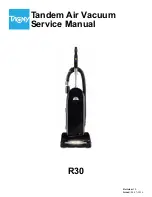
21
PROBLEM
POSSIBLE CAUSE(S)
CORRECTIvE ACTION
Engine fails to start 1. Spark plug wire disconnected.
1. Connect wire to spark plug.
2. Safety switch not contacted.
2. Correctly install hose adapter nozzle.
3. Fuel tank empty, or stale fuel.
3. Fill tank with clean, fresh fuel.
4. Fuel shut-off valve closed (if so
equipped).
4. Open fuel shut-off valve.
5. Faulty spark plug.
5. Clean, adjust gap or replace.
Loss of power;
1. Spark plug wire loose
1. Connect and tighten spark plug wire.
operation erratic.
2. Unit running on CHOKE.
2. Move choke lever to OFF position.
3. Blocked fuel line or stale fuel.
3. Clean fuel line; fill tank with clean fresh gasoline.
4. Water or dirt in fuel system.
4. Disconnect fuel line at carburetor to drain fuel tank. Refill
with fresh fuel.
5. Carburetor out of adjustment.
5. Adjust carburetor.*
6. Dirty air cleaner.
6. Service air cleaner.*
Engine overheats
1. Carburetor not adjusted properly.
1. Adjust carburetor.*
2. Engine oil level low.
2. Fill crankcase with proper oil.
Too much vibration 1. Loose parts or damaged impeller.
1. Stop engine immediately and disconnect spark plug
wire. Tighten all bolts and nuts. Make all necessary repairs.
If vibration continues, have unit serviced by an authorized
service dealer.
Unit does not
discharge
1. Discharge chute (elbow) clogged.
1. Stop engine immediately and disconnect spark plug
wire. Clean inside of housing and discharge chute (elbow).
2. Foreign object lodged in impeller.
2. Stop engine immediately and disconnect spark plug
wire. Remove lodged object.
3. Vac Cart is full.
3. Empty cart.
*Refer to the engine manual packed with your unit.
NOTE:
For repairs beyond the minor adjustments listed above, please contact your nearest authorized service dealer.
Clean the engine and the entire unit thoroughly.
•
Refer to engine manual for correct engine storage
•
instructions.
If storing in an unventilated or metal storage shed,
•
coat metal parts with light oil or silicone to prevent
rust.
Store unit in a clean, dry area.
•
It is important to prevent gum deposits from forming in
essential fuel system parts such as the carburetor, fuel
filter, fuel hose or tank during storage. Also, alcohol
blended fuels (called gasohol or using ethanol or
methanol) can attract moisture which leads to separation
and formation of acids during storage. Acidic gas can
damage the fuel system of an engine while in storage.
To avoid engine problems, the fuel system should be
emptied before storage of 30 days or longer. Follow the
instructions in the engine’s Operating &
Maintenance Manual.
TROUBLESHOOTING
STORAGE AND OPTIONAL USE
TO USE THE CART WITHOUT THE vAC SYSTEM
Remove bolts holding frame to cart and store bag and
•
frame in a safe place.
CAUTION: The muffler and adjacent areas
are
hot!
Keep removed bolts, washers and nuts in a safe place
•
with bag.
Remove and store the four bolts and nuts which
•
fasten the engine base to the tongue.
Slide the engine off the tongue and store in a safe
•
storage area.







































